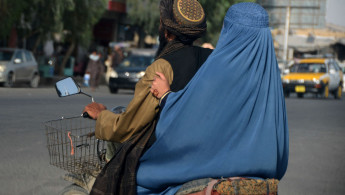Afghan women told by Taliban to send male relative to replace them at work
Afghan women were told by Taliban officials to send a male relative to their workplace to replace them, in yet another example of the hardline group cracking down on female freedoms following their 2021 return to power.
As many as 60 female workers in Afghanistan’s finance ministry received a call from the Taliban requesting they recommend a male relative in their place because the “workload in the office has increased,” according to a report by The Guardian.
Female staff, who were sent home after the group regained power in August and have since been paid a reduced salary, expressed outrage over the request.
They pointed out that they had spent years in service in highly specialised roles and expressed anxiety and uncertainty over their futures.
37-year-old Maryam, a long-term employee of the Afghan finance ministry, received a call from the HR department.
“I was asked to introduce a male family member to replace me at the ministry, so I could be dismissed from the job," she told The Guardian.
“This is a difficult and technical position I was trained for and have years of experience in. And even if he could do the same work eventually, what would happen to me?”
Since seizing power last year, the hardline Islamist group have introduced several measures which constrain women’s rights and freedoms, contradicting initial announcements that they would be more progressive than during their first period of rule, which lasted from 1996 to 2001.
Afghan girls in some provinces have been barred from attending school for over a year and women across several sectors were dismissed from work.
“Afghan women’s rights activists warned all along that the Taliban’s promises to respect women’s rights were false,” said Heather Barr, Associate Director of the Women’s Rights Division in Afghanistan for Human Rights Watch.
“They warned in the days after the Taliban took the capital... And that’s what happened”.
Just this week, The Taliban ordered their most restrictive hijab regulation on female students at a polytechnic university, reported Afghan news outlet Rukhshana.
This decision led to at least two female students deferring their studies, Rukhshana reported.
It follows an order in May, denounced by the international community, calling on all Afghan women to wear mandatory face covering in public.





 Follow the Middle East's top stories in English at The New Arab on Google News
Follow the Middle East's top stories in English at The New Arab on Google News
![22 Arab countries at COP29 have rejected the targeting of fossil fuels [Getty]](/sites/default/files/styles/image_330x185/public/2024-11/GettyImages-2184289638.jpg?h=199d8c1f&itok=ptHl5bec)
![Dozens of people turned out for the funerals [Getty]](/sites/default/files/styles/image_330x185/public/2024-11/GettyImages-2185229760.jpg?h=e7c891e8&itok=1bctDcE6)
![The UAE is widely suspected of arming the RSF militia [Getty]](/sites/default/files/styles/image_330x185/public/2024-11/GettyImages-472529908.jpg?h=69f2b9d0&itok=Yauw3YTG)